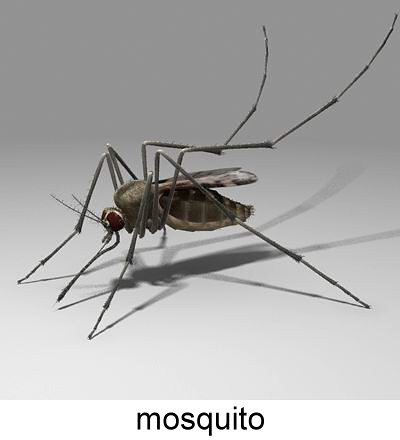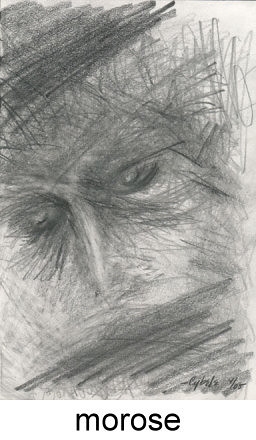
morose
adj. 脾氣壞的;陰鬱的 [Someone who is morose is miserable, bad-tempered, and not willing to talk very much to other people. ]
聯想:mo-rose
女朋友沒(mo)送她玫瑰(rose),於是她開始耍自閉(morose)

morsel
n.(食物的)一口 [A small piece of food.]
ex. a morsel of cake
ex. Each morsel is a joy!
每一口都是享受
n.少量 [A small amount; a piece]
ex . a morsel of gossip.
字源(看看就好):morsel 與 mordant是同源的,其中的mor都是bite咬的意思。
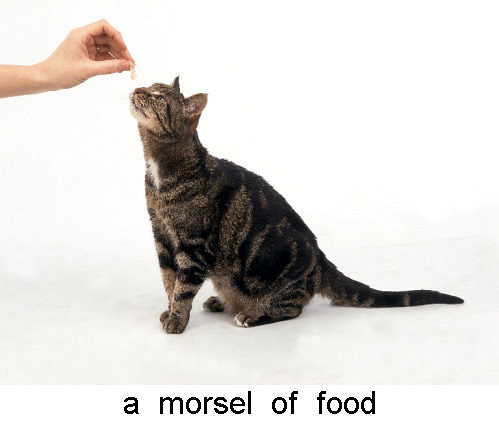
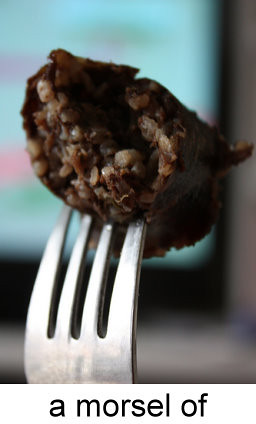
moribund
mori(to die)-bund
adj.垂死的 [in a dying state; near death.]
ex. the moribund housing market
ex. a moribund patient
音:末日伴的
字源: mori- (to die) + - bundus adj. suffix 
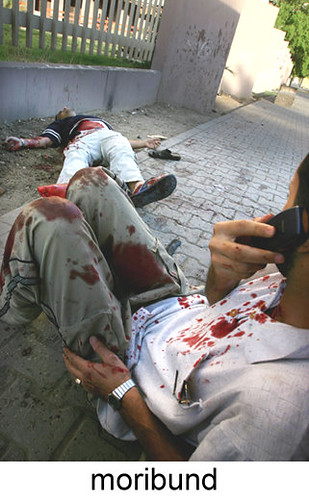
mortality
mort(death)-al-ity
n. [The quality or condition of being mortal.]
n.大量的死亡 [Death, especially of large numbers; heavy loss of life]
ex. the mortality brought by an epidemic
n. [Death rate, or the rate of failure or loss]
ex. The mortality from lung cancer is increasing.
肺癌死亡率在增多。
Infant Mortality
mortuary
mort(death)-uary
n.太平間 [funeral home]
ex. a mortician works in a mortuary
字源:Meaning "place where bodies are kept temporarily" first recorded 1865, a euphemism for earlier deadhouse
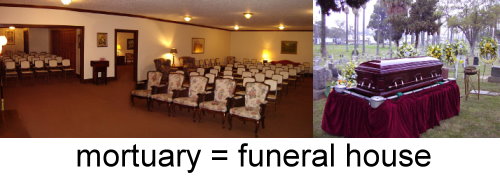
電影Mortuary blues
在一條偏僻漁村內村民不事生產生活富裕,引起警長懷疑並追查。原來在六百多年前該村祖先搶掉一艘官船上的金銀珠寶,並把珠寶藏在一塔內。當眾人尋寶到該塔時,誤放秦屍出關...
mortify
mort( death)-ify
v.使感屈辱 [to humiliate or shame, as by injury to one's pride or self-respect]
ex. The teacher was mortified by his own inability to answer such a simple question.
老師因自己回答不出如此簡單的問題而感到羞愧
v.【宗】克制 [To discipline (one's body and physical appetites) by self-denial or self-inflicted privation.]
字源:late 14c., "to kill," from O.Fr. mortifier , from L.L. mortificare "cause death," from mortificus "producing death," from L. mors (gen. mortis) "death" (see mortal) + root of facere "to make" (see factitious). Religious sense of "to subdue the flesh by abstinence and discipline" first attested early 15c . Sense of "humiliate" first recorded 1640s (in mortification). Related: Mortified; mortifying..
14c. 古法文中的 mortifier指的是to kill,
而在15c. 發展出了具有宗教意謂的字義,【宗】克制
接著16c. 生成了"使感屈辱"的字義。
mortification
mort-ification
n.屈辱 [a feeling of humiliation or shame, as through some injury to one's pride or self-respect.]
ex. To my mortification, my manuscript was rejected.
使我感到失面子的是:我的稿件被退了回來。
n.【宗】克制 [Discipline of the body and the appetites by self-denial or self-inflicted privation.]
ps.mortification 也是一個band的名字
mortgage
mort(dead)-gage(pledge)
n.抵押品 [A temporary, conditional pledge of property to a creditor as security for performance of an obligation or repayment of a debt.]
ps. mortage就是你為了借錢而拿去抵押的物品,用物品→錢
ex. The bank refused to accept any mortgage on land.
銀行拒絕接受任何土地抵押。
v.抵押 [If you mortgage your house or land, you use it as a guarantee to a company in order to borrow money from them. ]
n.房貸 [A mortgage is a loan of money which you get from a bank or building society in order to buy a house. ]
ps.就是你跟銀行借的錢,特指是為了買房子的錢。

Word History:
The great jurist Sir Edward Coke, who lived from 1552 to 1634, has explained why the term mortgage comes f rom the Old French words mort, "dead," and gage, "pledge." It seemed to him that it had to do with the doubtfulness of whether or not the mortgagor will pay the debt. If the mortgagor does not, then the land pledged to the mortgagee as security for the debt "is taken from him for ever, and so dead to him upon condition, &c.And if he doth pay the money, then the pledge is dead as to the [mortgagee]."This etymology, as understood by 17th-century attorneys, of the Old French term morgage, which we adopted, may well be correct. The term has been in English much longer than the 17th century, being first recorded in Middle English with the form morgage and the figurative sense "pledge" in a work written before 1393.
簡單來說,如果抵押者沒有還錢,那他的東西就會被拿走了,也就是物品死了。而如果抵押者還錢了,那麼這個pledge(抵押)就結束了,也就是死了。所以不管怎樣都有一方會死,因此抵押品才跟死有關。
mortar
n. 臼 [A vessel in which substances are crushed or ground with a pestle .]
n. 黏磚頭、砌水泥的泥
n.迫擊砲 [A portable, muzzleloading cannon used to fire shells at low velocities, short ranges, and high trajectories]
ex. The two sides exchanged fire with artillery, mortars and small arms.
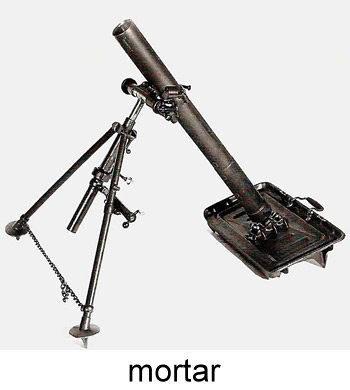
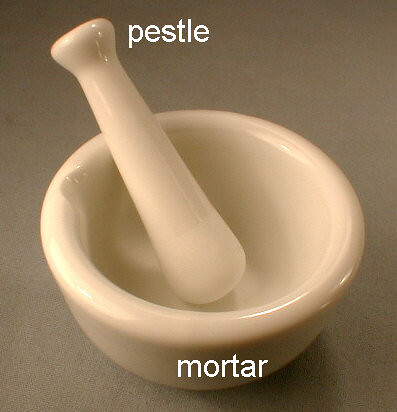
mosaic
n.馬賽克畫 [A picture or decorative design made by setting small colored pieces, as of stone or tile, into a surface.]
字源:mosaic是從 Muse(女神) 來的,中世紀的馬賽克畫經常是 為Muse女神們所製作的,所以這類的藝術形式就以Muse來造出字。
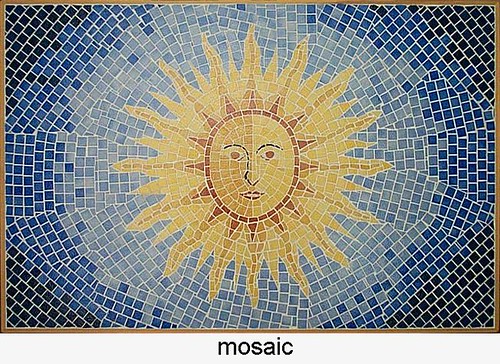
tile:mosaic
mosque
n.清真寺,回教寺院 [a Muslim temple or place of public worship.]
字源:from Arabic masjid [mæsdʒɪd] "temple, place of worship,"
review minaret
minaret是尖尖高高的塔,屬於mosque的一部分。
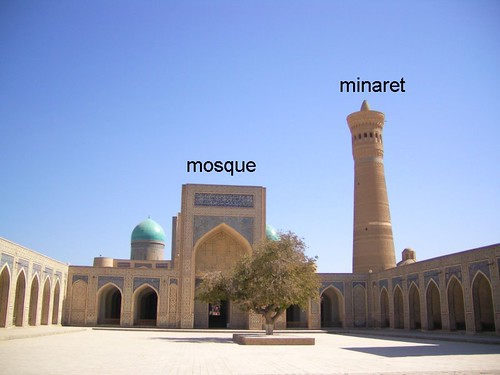
spire:church=minaret:mosque
塔尖在教堂上=尖塔在清真寺上
mosquito
小故事:我有個日本朋友,她名字的發音很像mosukito...我都叫她蚊子小姐
